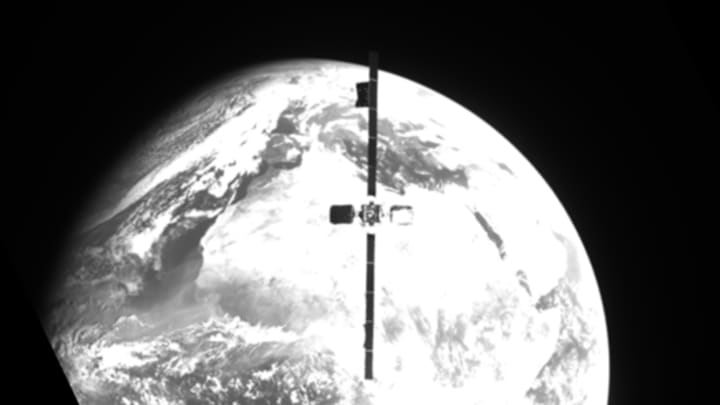In Today’s Deep Space Extra… The first Space Launch System core stage is undergoing preparations ahead of its trip from NASA’s Stennis Space Center to the Kennedy Space Center. Ingenuity won’t be flying this week.
Human Space Exploration
NASA SLS Green Run testing complete, Boeing readies Core Stage for tow to Florida
Coalition Members in the News – Aerojet Rocketdyne, Boeing, Jacobs, United Launch Alliance
NASAspaceflight.com (4/12): NASA’s Space Launch System (SLS) core stage and its four rocket engines have completed the post March 18 hot fire test and analysis phase. Preparations of the core stage hardware for its barge trek from NASA’s Stennis Space Center in Mississippi to the Kennedy Space Center (KSC) in Florida by the end of April are underway. At KSC, the core will be connected to its solid rocket boosters in mid-May. That will begin preparations for the launch of Artemis I, an unpiloted test flight of an Orion crew capsule launched aboard SLS on a multi-week trip around the Moon and back to Earth, perhaps by early November.
China preparing Tianzhou-2 cargo mission to follow upcoming space station launch
SpaceNews.com (4/13): A long March 7 rocket arrived at the Wenchang spaceport to support the Tianzhou-2 supply mission to Tianhe, the Chinese space station module set to launch in late April. The Tianzhou-2 mission will provide Tianhe with propellant for maintaining its orbital altitude as well as supplies for hosting astronauts.
Space Science
Mars helicopter needs a software update before attempting first flight
Spaceflightnow.com (4/12): The first flight of NASA’s Ingenuity Mars helicopter has been postponed again from no earlier than Wednesday until later this month. The helicopter will need a software update, mission managers announced Monday. It could be next week before the date for another flight attempt is announced.
Opinion
For human spaceflight, better late than never
Coalition Members in the News – Axiom Space, Boeing, Lockheed Martin, United Launch Alliance
The Space Review (4/12): Noting that Monday marked the 60th anniversary of the first human spaceflight carried out by Soviet cosmonaut Yuri Gagarin and the 40th anniversary of the first NASA space shuttle mission, Space Review editor Jeff Foust acknowledges that moving on in spaceflight has been a challenge. That said, we may in the U.S. soon see regular human suborbital jaunts aboard Blue Origin and Virgin Galactic spacecraft, commercial orbital missions aboard Boeing’s CST-100 Starliner and SpaceX’s Crew Dragon, and human missions to the Moon aboard NASA’s Orion. China is preparing to launch astronauts this year, and India is developing its own human spaceflight program. The uncertainty over the future a decade ago is largely, if belatedly, fading.
Other News
Northrop Grumman robotic MEV-2 spacecraft, in a first, catches active Intelsat satellite
Coalition Member in the News – Northrop Grumman
CNBC (4/12): Launched in August, Northrop Grumman’s Mission Extension Vehicle-2 (MEV-2) latched onto the 18-year-old Intelsat IS-10-02 communications satellite late Sunday ready to provide another five years of operational life before moving on to another satellite customer. MEV-2 is part of a new satellite endeavor, on orbit service, assembly and manufacturing. “You can think of MEV-2 as a jetpack for the 10-02 satellite,” according to a Northrop Grumman representative. The MEV-2 operations followed the MEV-1 demonstration last year with an inactive target satellite.
DARPA selects Blue Origin, Lockheed Martin to develop spacecraft for nuclear propulsion demo
Coalition Member in the News – Lockheed Martin
SpaceNews.com (4/12): The Defense Advanced Research Projects Agency (DARPA) announced Monday the selection of Blue Origin and Lockheed Martin to develop competing spacecraft concepts for the demonstration of a nuclear thermal propulsion system beyond low Earth orbit. The selection of General Atomics was announced earlier under a $22 million contract to develop a space nuclear reactor as part of the Demonstration Rocket for Agile Cislunar Operations (DRACO) initial phase. Lockheed Martin and Blue Origin will develop host spacecraft concepts for the second phase under contracts valued at $2.9 million and $2.5 million respectively. The technology is intended to hasten travel to the Moon and Mars.
Atlantic Council calls for U.S. and allies to lead global efforts on space security
SpaceNews.com (4/12): The Atlantic Council, an international security think tank, issued a lengthy report on Monday noting the large number of countries now involved in space operations. The report calls for an overhaul of the 1967 Outer Space Treaty, the primary body of law governing behavior, in order to update efforts to prevent conflict based on the current space environment and forecast for future activity. Russia and China are urged to pull back from the testing and deployment of anti-satellite weapons.

